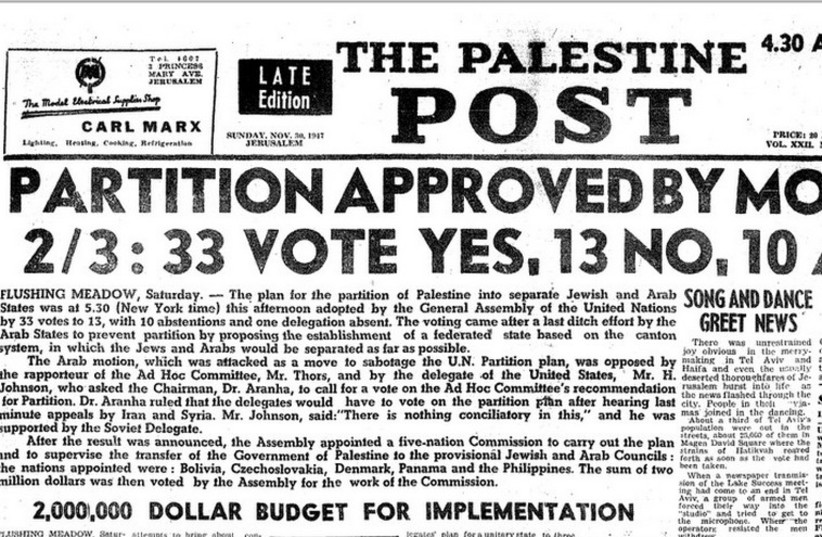November 29, 2022 marks 75 years since the historic move of the United Nations to partition the British Mandate of Palestine into two countries, one Jewish and one Arab, essentially launching the birth of the State of Israel.
The decision to do so was made by the UN General Assembly as part of Resolution 181 (II) and sought to end the British Mandate and transform it into two new sovereign states.
However, while the decision was accepted by the Jews, represented by the Jewish Agency and Zionist factions, it was rejected by the Arabs, and a war ensued during which Israel achieved independence.
“On the 29th November, 1947, the United Nations General Assembly passed a resolution calling for the establishment of a Jewish State in Eretz Israel; the General Assembly required the inhabitants of Eretz Israel to take such steps as were necessary on their part for the implementation of that resolution. This recognition by the United Nations of the right of the Jewish people to establish their state is irrevocable. This right is the natural right of the Jewish people to be masters of their own fate, like all other nations, in their own sovereign state.”
Israeli Declaration of Independence
The partition of Palestine and the birth of Israel
The plan proposed partitioning Mandatory Palestine at the end of the British Mandate into two states, one Jewish and one Arab, with Jerusalem being controlled by an international regime.

Internationally, the plan saw support from the US, France, Canada, Liberia, Sweden and Norway. However, it also faced opposition from several other countries like India.
The plan was accepted by many Jews, albeit some with reluctance due to territorial concessions. But ultimately, many Jews both in Mandatory Palestine and abroad were satisfied with it.
Arab leaders widely rejected the plan, however. They had announced they would refuse to be bound by this decision, which they claimed was made under duress, and vocally expressed their opposition to what they declared was a violation of self-determination.
Ultimately, the resolution was not carried out and Arab countries attacked Israel. This in turn led to the 1948 War of Independence, which saw Israel defeat its Arab neighbors and achieve independent statehood.
However, it is still enshrined as an important part of Israeli history, with a street being named "November 29 Street" in Jerusalem and the partition plan being mentioned in the Declaration of Independence:
“On the 29th November, 1947, the United Nations General Assembly passed a resolution calling for the establishment of a Jewish State in Eretz Israel; the General Assembly required the inhabitants of Eretz Israel to take such steps as were necessary on their part for the implementation of that resolution. This recognition by the United Nations of the right of the Jewish people to establish their state is irrevocable. This right is the natural right of the Jewish people to be masters of their own fate, like all other nations, in their own sovereign state.”
In later years, the date would also become known as the annual International Day of Solidarity with the Palestinian People, a United Nations-organized event observed since 1978.
Created as a result of UN General Assembly resolution 32/40 B in 1977, this specific date was chosen in memory of the partition plan.
This day of solidarity is still recognized and observed by events, typically held at the UN headquarters in New York and offices in Vienna, Nairobi and Geneva, as well as other places.
Many high-ranking UN officials, NGOs and other public figures tend to make statements regarding Palestine and the ongoing Israeli-Palestinian conflict in special meetings at these events. Indeed, as noted by the UN's website, it is also the day when the UN General Assembly holds its annual debate about Palestine.
